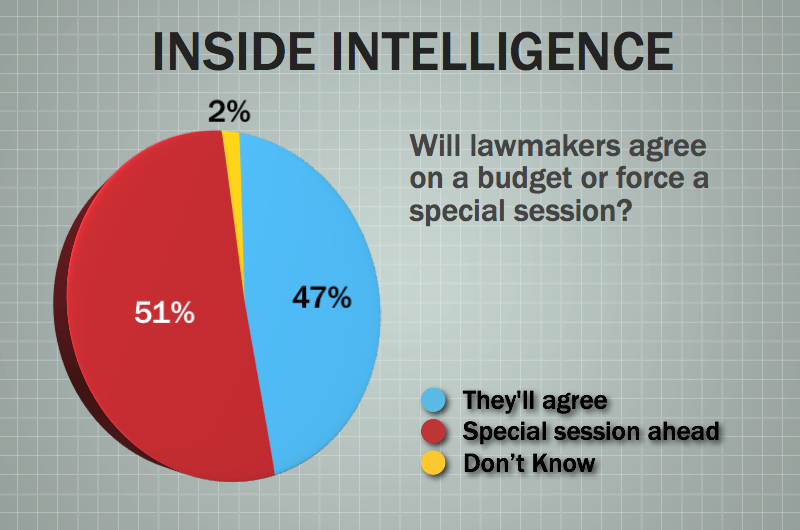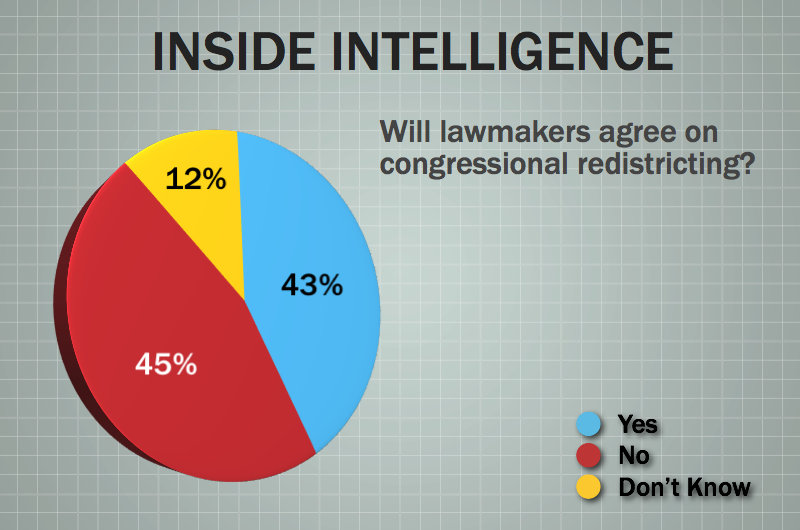Sen. Steve Ogden is still looking for 20 fellow senators willing to start the debate on the 2012-2013 state budget. It takes 21 to bring it up for consideration, and efforts to get that number together have fallen short for more than a week. Now, with less than a month left in the legislative session and the debate on redistricting on hold until after the budget has come to a vote, the pressure is on.
So Ogden, the Bryan Republican who chairs the Senate Finance Committee, is looking for something that will break the gridlock.
The problem, in a nutshell, is that some senators don't want to use the state's Rainy Day Fund, and the Finance panel's proposal uses around $3 billion from that account. Taking it out and cutting the budget loses votes from senators who think the proposed cuts are already deep enough, or in some cases, too deep. Leaving it in — even if senators were inclined to do so — defies the governor and the House, who have said by declaration and by vote that they don't want to get into the state's savings account. Ogden says it would gain Republican votes, and was asked if he could keep any Democrats in the fold with that plan.
"Well, I haven't had any Democrat votes lately," he says. "I'm not losing any."
Two Democrats — Sens. Juan "Chuy" Hinojosa of McAllen, and Royce West of Dallas — voted for the budget in committee. But Ogden says that was the extent of their promise; neither agreed to vote to bring it up for debate in the full Senate, he says.
"We continue to work on finding 21 votes, and so every proposal has advantages and disadvantages and we just keep working until we find the combination," he says.
"I told you last week, the issue is not the spending — it's the method of finance. So we're looking for a method of finance that 21 senators can support. There are different possibilities out there. It may be necessary to spend so much of the Rainy Day Fund but still finance this bill, so we're looking at that," he says.
One idea is to take the Rainy Day money out of the budget. That leaves the plan about $3 billion out of balance. Cutting that much would lose votes, but there might be other ways to pay for the budget.
Ogden said senators could include an across-the-board cut in state spending in the budget and allow the state comptroller to erase that spending cut if the money becomes available. The theory is that Comptroller Susan Combs is being overly conservative with her official estimate of state revenue — that the money is going to be available after all — and that lawmakers can rely on that money to bring spending up to the level they want.
"I think the comptroller is wrong about her revenue estimate, and I think we can make contingency appropriations that have a high probability of being approved," Ogden says.
"I was looking at her cash report and revenue estimate this weekend; she's predicting that oil prices will be 67 bucks in 2012," he says. "Well, I wouldn't take that bet and I don't know who else will. She's predicting oil prices are 70 bucks now. Well, they're not — they're $108… There are discussions going on about how we take advantage of that if the revenue estimate is too low."
That across-the-board cut, he says, could be refined when the House and Senate reconcile their plans, perhaps turned into a list of specific programs that would get money as it becomes available instead of a general cut on all agencies.
Some senators from both parties are worried about what will come back if they send the Senate proposal to a legislative committee to reconcile it with the much more stringent House version. "It's not the Senate budget or the House budget that will come back to us," said one Democrat. "It's the conference committee report, and we're afraid that will have cuts we can't support."
They've suggested a special rule that would require a Senate super-majority for final approval of that negotiated budget. Under current rules, a simple majority could bless it; if they require two-thirds approval, that blessing would have to be bipartisan.
"I don't think there's 16 votes to support that," Ogden says, "So it doesn't make any difference how I feel."
Ogden and others counter-proposed that a letter be written stating the Senate's unwillingness to support a budget that goes below some specified size and getting signatures from enough senators to enforce it. With that in hand, they suggest, the Senate might get over its jitters. That idea has a mixed history; a similar pact on a school voucher bill several years ago fell apart when one of the signers changed his mind.
They could replace Rainy Day money with more "non-tax revenue" from the stack of ideas they've already seen and declined to put into the budget. Ogden says he can't fund the proposed budget unless he gets that and other legislation out of the Senate. A bill that reforms public education — SB 22 — has to pass to make the budget works. And if it doesn't pass, he says, the Legislature ought to come back for special session this summer "or we're just kicking the can down the road."
As a last resort, Ogden pointed to a provision already in the budget that instructs the comptroller on how to cut the budget if the money falls short and the Legislature isn't in town. It's an across-the-board cut, with exceptions for public education, higher education, pension plans for teachers and state employees, debt service, and compensation for crime victims. "I think for purposes of getting the bill out of here that we can rely on that," Ogden says.
With all of that going on, the Finance Committee got a look at a supplemental appropriations bill that would spend just under $4 billion, including $3.3 billion from the Rainy Day Fund. That would cover the deficit in the current budget, which runs though the end of August. It includes money for public schools, for medical care in prisons and for unexpected expenses from wildfires this spring. A similar measure already passed the House.
Asked about the coming deadlines and his chances, Ogden is still optimistic. "You know, I bet we get a bill out of here." When? "Before it's over."




